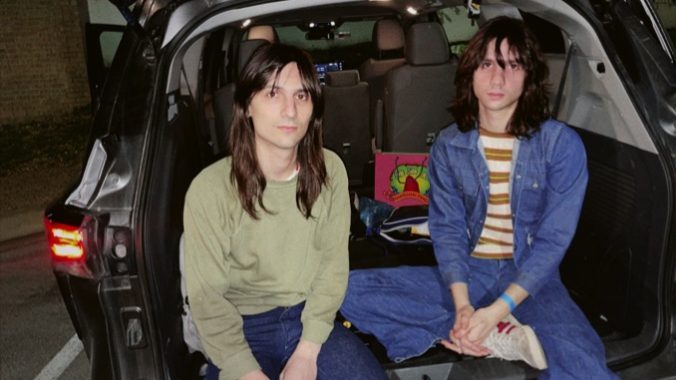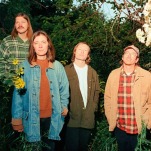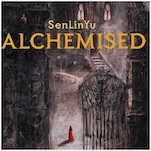The 10 Best Albums of May 2023
The Lemon Twigs photo by Matt Mitchell
What happened to May? One minute we were talking about how good that new National album was and the next we’re getting ready for Bully’s fantastic new record. But we’d be remiss not to stop and take a moment to recap the abundance of wonderful music released this past month. Here, in alphabetical order, are the 10 best albums of May 2023.
AJJ: Disposable Everything
Disposable Everything is AJJ’s big reconciliation with the current state of affairs and the band’s place in all of it. What role should five men have in preserving any semblance of goodness that might still be left in this country? On Disposable Everything, AJJ aren’t quite sure they should have a role at all. In a world plagued by mainstream artists attempting to spin shallow money-grabs into wholehearted, political decrees, the band is not all that interested in shining the empathy on in ways they cannot authentically provide. There is no demand for revolution on this album; only the stark realization by the men who made it that they, too, have been lubing the cog that makes the machine of inequity crawl forward. Disposable Everything knocks on the door of modern masterpiece status, as AJJ have taken every single thing they do well, shoved it into a blender and made a chunky, absurd, glorious, gilded smoothie with it. —Matt Mitchell
Arlo Parks: My Soft Machine
After a year spent touring with Harry Styles, Clairo and Billie Eilish, among others, Arlo Parks’ sophomore album, My Soft Machine, the awaited follow-up to her Grammy-nominated debut Collapsed in Sunbeams, is finally on the horizon. With a title lifted from Joanna Hogg’s 2019 film The Souvenir, Parks is aiming to reckon with the highs and lows of her 20s. “This record is life through my lens, through my body—the mid-20’s anxiety, the substance abuse of friends around me, the viscera of being in love for the first time, navigating P.T.S.D. and grief and self-sabotage and joy, moving through worlds with wonder and sensitivity – what it’s like to be trapped in this particular body,” Parks said of My Soft Machine in a statement. Lead single “Weightless” is a fit of electronic joy that puts Parks’ soft vocals on a pedestal at the track’s forefront, a trend that continues across the singer-songwriter’s entire record. —Matt Mitchell
Dean Johnson: Nothing For Me, Please
Hailing from Washington State, folk troubadour Dean Johnson has been around for almost two decades. Today, his long-awaited debut LP, Nothing For Me, Please finally arrives. Conjuring the best pieces of John Prine, Townes Van Zandt and Blaze Foley, Nothing For Me, Please is not your prototypical country record. Instead, it’s a widely spun tapestry of a colored lands where curious eyes and hearts roam. Songs like “Faraway Skies,” “Shouldn’t Say Mine” and “True Love” are immediate bedrocks of contemporary folk playlist. And, at the center of it all, remains Johnson’s awing vocal, which careens through octaves into a breathtaking falsetto you can’t help but fall in love with. —Matt Mitchell
Durand Jones: Wait Til I Get Over
The first single from Durand Jones without his backing band, The Indications, is a slow-burning soul ballad that serves as both a coming-out and coming-home song. Now based in San Antonio, his upcoming album Wait Til I Get Over is all about his relationship with his hometown of Hillaryville, La. The emotions build with screaming guitars as the cinematic video unveils a young, queer love in a rural, Black community on one of the final bends in the Mississippi River. Jones’ voice carries the weight of complications and contradictions as he digs into the past. “Miss Sadie” is the type of giant, throwback soul ballad that he perfected with his Indication bandmates. And “Lord Have Mercy” is a funky blues party. —Josh Jackson
Gia Margaret: Romantic Piano
Romantic Piano was engineered predominantly by Sean O’Keefe, while Margaret mixed and produced much of it alongside Yoni Wolf. Employed across the album are, as Margaret calls them, field recordings of nature that delight in unison with the pianos, horns, drums, bass and vocals she and her peers plug into throughout the 12-song, 27-minute run-time. Perhaps the greatest part of Romantic Piano‘s makeup is how human all of it sounds. Much akin to the recent, swelling trend of artists recording their albums in a live headspace—in hopes of harnessing what an on-stage energy might look like on tape—Margaret catches all of the imperfections happening concurrently—whether it’s a crackle of house foundation of a street growing busy—and fashions everything into an immersive nebula of DIY ethos. At its core, Romantic Piano is a perfect love-letter from Margaret about embracing the instrument she turned to when her voice couldn’t continue. But by no means is her piano-playing merely a second option in the wake of change. No, no. By the tracklist’s end, Romantic Piano morphs into the opus of someone whose talents and vision could give a crack of lightning a run for its money. —Matt Mitchell
Greg Mendez: Greg Mendez
“Picking up the things you left / I never thought I’d be so upset” are the lines Greg Mendez uses to open his new, self-titled album. It’s a fitting entrance for the Philadelphian, as he spends the next nine songs putting back together the fragments of his own life—attempting to understand the absurdity of his own truth and what hard damage has met him on the road to clarity. Ever the master of his storytelling craft, Mendez makes a bookend out of imagery that can be plugged into anyone’s own correspondence with the world around them. Greg Mendez is one man’s vulnerable, open book made accessible to anyone who might find something courageous or trusting within it. From drug use to heartbreak to childhood trauma to houselessness, Mendez offers a loving embrace drenched with hindsight to his former self. In turn, the album is not a critique of his past, but an attempt at understanding how it informs his personhood in the present. He populates the tracklist with recoiling and punctuated stories that are as humorous as they are heartbreaking. —Matt Mitchell
Hannah Jadagu: Aperture
To be direct in our communication with others is often a misunderstood approach. When we deliver sharp, necessary truths and leave dead air to hold the space that follows, it’s perceived as being rude or abrupt, but both parts of that interaction serve their own purpose: If the spoken statement cuts down to the bone, all of the unspoken emotion which prompted its delivery hangs in the surrounding silence. In singer/songwriter Hannah Jadagu’s case, she fills that silence with layers of MIDI instruments and echoing guitar melodies, as if she’s aware of how her swift and punishing lyrical turns need to be softened by noise that will express the teary-eyed motivation behind it. It’s in the riff which bolsters the damning shock of repeating “I know what you did” over and over again. It’s in the beat looping beneath the confession of “I don’t wanna work this out.” It’s in the keyboard line layered over the finality of “Am I supposed to say I don’t care? / ‘Cause I’ll turn my back / Now you’re faced with that.” That last line appears at the beginning of “Warning Sign,” the third single from Jadagu’s debut album, Aperture. If the sucker punch of a lyric is her shoving you back, the soundscapes it’s wrapped up in contain the universe of feelings you both might have in response to that action but don’t know how to voice. It’s the way your eyes water involuntarily in the aftermath. On Aperture, you hear an artist staking her claim, going through the first of many steps in an ongoing evolution. In sharing her collection of magnified, bittersweet goodbyes, Jadagu unlocks an interior world worth making a racket about. Hopefully, the next step is as monumental and moving as the sound she creates. —Elise Soutar
Mega Bog: End Of Everything
Erin Birgy, the force behind Mega Bog, is not one to shy from experimentation. Over her past six albums under the project, Birgy’s arsenal of avant-pop tools grows every time, and with each aesthetic pivot, the Mega Bog universe grows more colorful. On End of Everything, her first release with Mexican Summer, Birgy sought an icy, glistening synthpop palette, tapping collaborators like co-producer and Big Thief drummer James Krivchenia and multi-instrumentalist Aaron Otheim to help realize that vision. Overtop the swirling synths, Birgy’s voice dances with Broadway bravado as she reckons with personal traumas and an accelerating climate crisis. From her vantage point in Los Angeles, beneath the constant smog and within sight of burgeoning forest fires that grow more deadly by the year, she sounds like a klaxon that cannot go ignored.Like Birgy’s previous two Mega Bog albums, Life, and Another and Dolphine, End of Everything is full of surprises, but its tools are more concentrated—centered on chilling production and curious, sometimes-confessional lyrics that sit prominently atop bold synthpop. Birgy’s transition into this musical realm is enthralling and promises more excitement from the dedicated experimentalist. As painstakingly beautiful as her more inscrutable records have been, to witness Mega Bog in crystalline electronica is to witness an artist reclaim and represent her consciousness with unsettling clarity. It is a privilege to behold. —Devon Chodzin
The Lemon Twigs: Everything Harmony
Recorded with Andres Valbuena and Daryl Johns and mastered by Bug Sound’s Paul Millar, Everything Harmony is the best thing the D’Addario brothers have ever made. The D’Addario brothers have long possessed a potent stronghold on the architecture of pop melodies. Brian and Michael have been calling Everything Harmony their “Simon & Garfunkel record,” given how much they let these new songs breathe atop dynamic, orchestral and—mostly—acoustic arrangements. Lead single—and longtime setlist cornerstone—“Corner Of My Eye” is very Fate for Breakfast-era Art Garfunkel, as Brian splays an inquisitive falsetto over a sweet, catchy, plucky melody. It’s chamber-pop perfected to a T, which you can hear through a delicious wall of harmonies cascading at the 1:50 mark. And while most of the album is a perfect, idealistic rendering of mid-century, singer/songwriter bliss, “In My Head” and “What You Were Doing” tap into the glam rock ethos that still courses through their veins. —Matt Mitchell
Water From Your Eyes: Everyone’s Crushed
Everyone’s Crushed, the latest album from experimental indie-pop duo Water From Your Eyes, picks up right where their last album left off. Its cheeky opening track, “Structure,” shares the same name as the Brooklyn natives’ 2021 breakthrough record. It’s as if vocalist Rachel Brown and multi-instrumentalist/producer Nate Amos are world-building, expanding on the lore of their dense catalog. On their first album for the revered indie titan, Matador Records, Water From Your Eyes deliver on the simmering anticipation surrounding them. It’s another case that marks Brown and Amos as one of the most innovative, exciting creative partnerships of the moment. Their vision has become fully reified, merging pop balladry, Berlin techno and indie rock in methods that seemed unfathomable until they executed it. Despite that record’s elliptical abstractions, Everyone’s Crushed takes their collagist ethos a step further. Brown and Amos have thrown Structure out the window, given that most tracks on this album defiantly resist actual structure itself. Take the standout closer, “Buy My Product,” which flouts a conventional verse-chorus format in lieu of tumultuous crescendos and swirling, discordant layering. While Brown’s lyrics maintain their dissociative, surrealist mindset, it’s hard not to hear “Buy My Product” as a noisy lament about the inescapability of hypercapitalism. Everyone’s Crushed shines an incandescent limelight on Water From Your Eyes at the absolute height of their powers; it’s their best work yet. —Grant Sharples







































